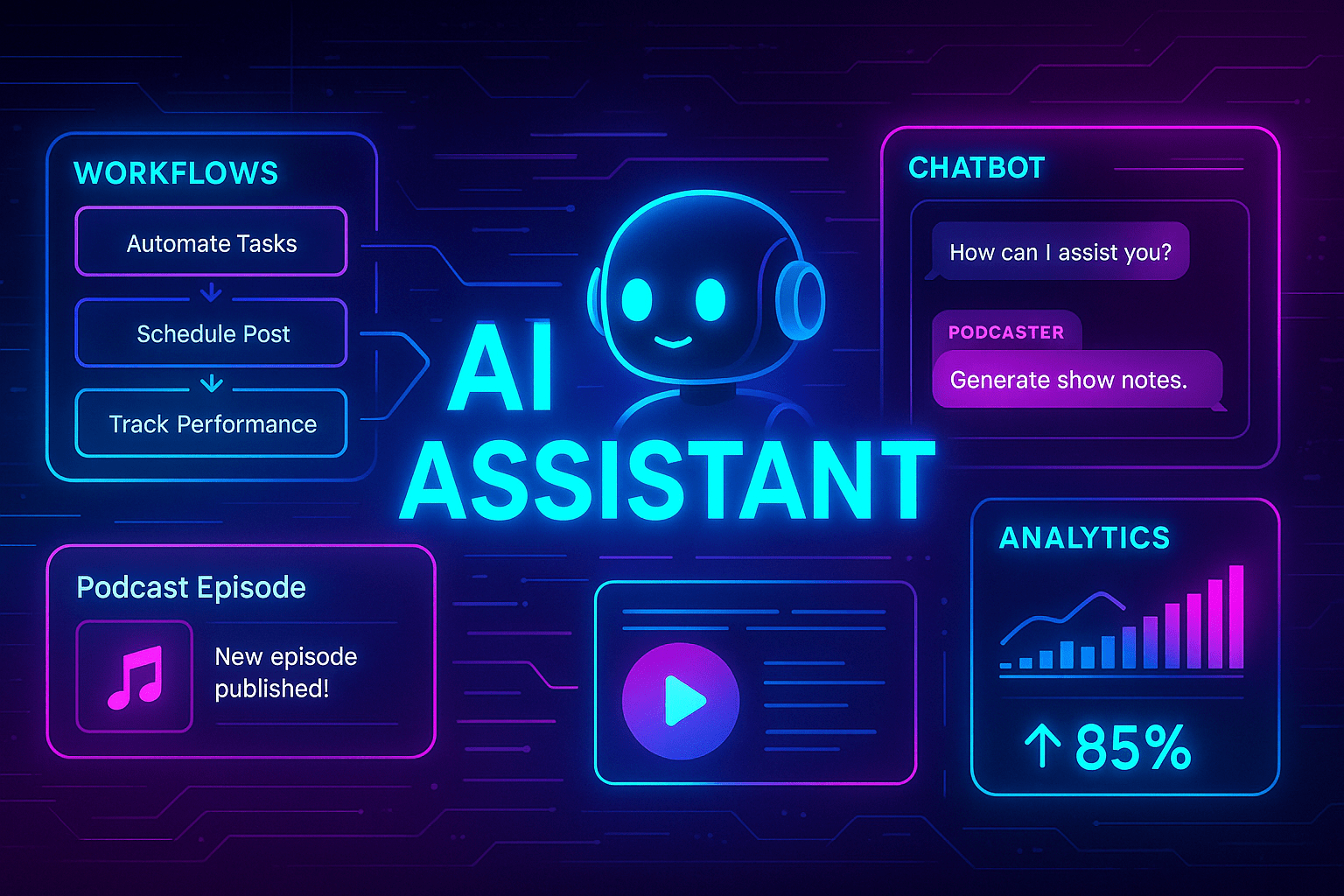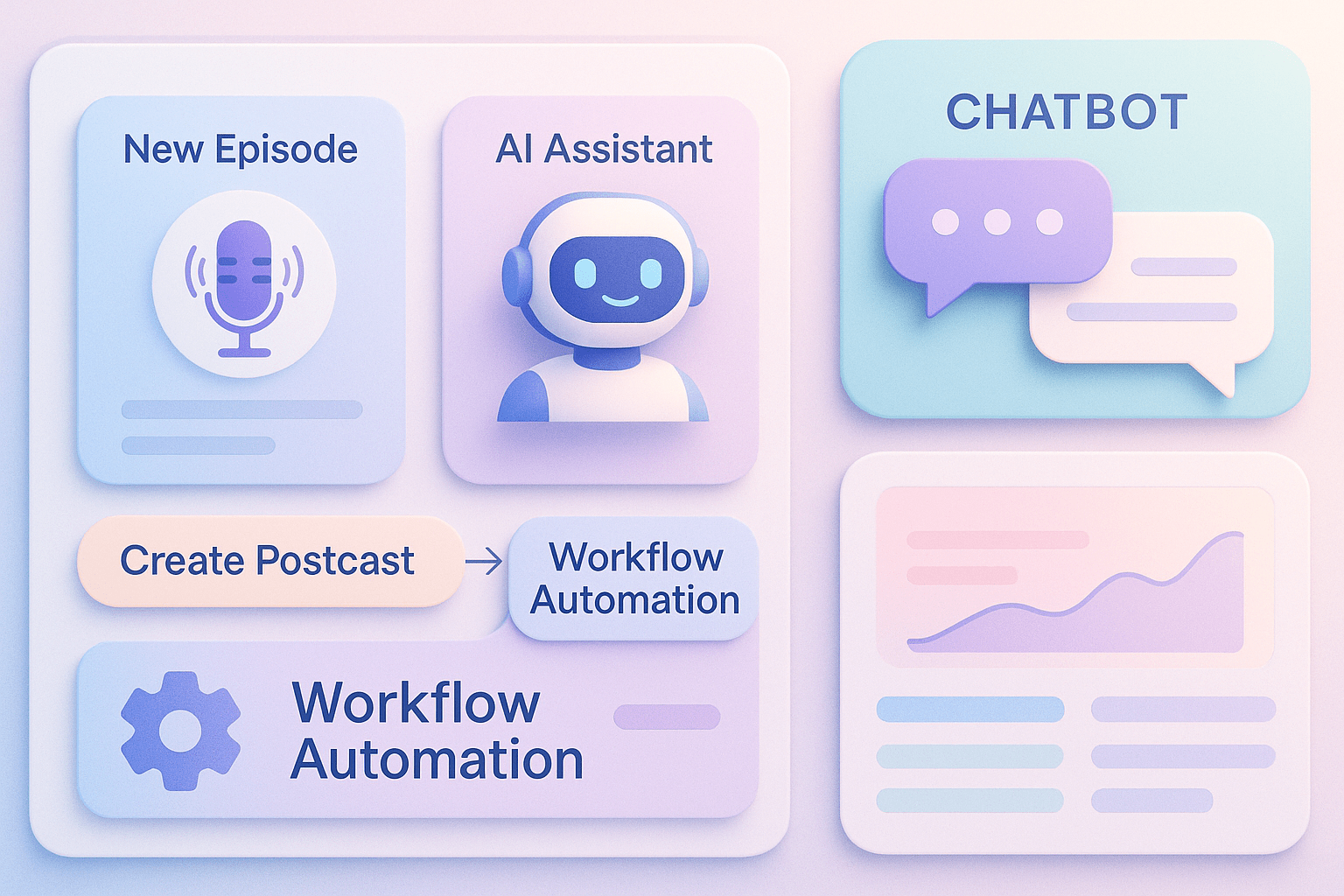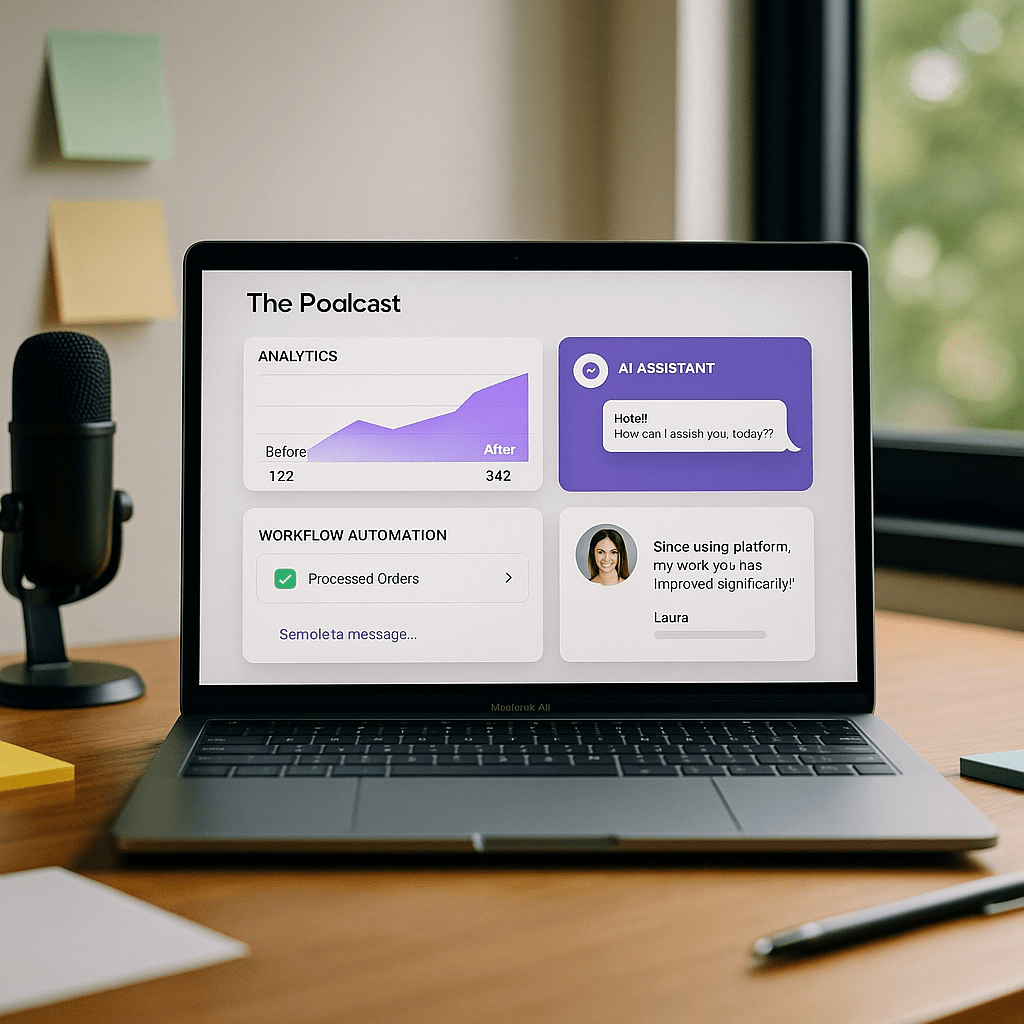Prompt Engineering Strategies Every Podcaster Needs
by Design Delulu Editorial · September 15, 2025

Podcasting has exploded into a billion-dollar industry, but with over 4 million active podcasts competing for attention, creators face unprecedented challenges. Between content planning, show notes, social media promotion, and audience engagement, podcasters are drowning in tasks that pull them away from what they do best: creating compelling audio content.
Enter prompt engineering—the game-changing skill that's revolutionizing how podcasters work with AI to streamline their workflow, amplify their reach, and reclaim their time. This comprehensive guide reveals the essential prompt engineering strategies that successful podcasters use to stay ahead of the competition.

Why Podcasters Need Prompt Engineering
Key Challenges Podcasters Face
- Content Creation Burnout: The average podcaster spends 8-12 hours per episode on tasks beyond recording—research, writing show notes, creating social content, and managing distribution across platforms. This overwhelming workload often leads to inconsistent publishing schedules and creator burnout.
- Audience Growth Stagnation: With new podcasts launching daily, standing out requires strategic content marketing, SEO optimization, and multi-platform promotion. Many podcasters lack the bandwidth or expertise to execute these growth strategies effectively.
- Time Management Crisis: Successful podcasters juggle multiple roles—host, researcher, editor, marketer, and community manager. Without efficient systems, they struggle to maintain quality while scaling their show.
- Technical Knowledge Gaps: From SEO optimization to social media algorithms, podcasters need diverse skills that extend far beyond audio production. Many creators feel overwhelmed by the technical aspects of podcast growth.
How Prompt Engineering Solves These Problems
Prompt engineering transforms AI from a basic tool into a sophisticated creative partner. By crafting precise, context-rich prompts, podcasters can:
- Automate Content Creation: Generate compelling show notes, episode descriptions, and promotional copy in minutes
- Scale Research Processes: Quickly synthesize complex topics into digestible talking points
- Optimize for Discovery: Create SEO-friendly titles, descriptions, and transcripts that boost search rankings
- Streamline Social Media: Produce platform-specific content that drives engagement and grows audience
- Enhance Audience Engagement: Develop personalized responses and community-building strategies

Essential Features of Prompt Engineering for Podcasters
Must-Have Prompt Engineering Tools
- Content Planning Prompts
- Episode brainstorming and topic research
- Interview question generation
- Seasonal content calendar development
- Trend analysis and topic validation
- Production Enhancement Prompts
- Show notes optimization
- Transcript refinement and SEO enhancement
- Chapter marker creation
- Call-to-action development
- Marketing and Promotion Prompts
- Social media content creation
- Email newsletter templates
- Press release generation
- Influencer outreach strategies
- Audience Development Prompts
- Community engagement responses
- Listener survey creation
- Feedback analysis and insights
- Personalized content recommendations
Real-World Prompt Examples
Episode Planning Prompt:
You're a podcast content strategist for [PODCAST NAME], a [GENRE] show targeting [AUDIENCE]. Based on current trends in [INDUSTRY/TOPIC], generate 10 episode ideas that: - Address specific pain points of our audience - Include trending keywords for SEO - Suggest potential guests or interview angles - Provide 3-5 key talking points per episode - Estimate audience engagement potential (1-10 scale) Format as: Episode Title | Description | Key Points | Guest Suggestions | SEO Keywords | Engagement Score
Show Notes Optimization Prompt:
Transform this podcast episode transcript into compelling show notes that: - Include an engaging episode summary (150-200 words) - Extract 5-7 key takeaways with timestamps - Generate 10 relevant SEO keywords naturally integrated - Create 3 social media teasers for different platforms - Suggest 2-3 related episodes for cross-promotion - Include clear calls-to-action for audience engagement Transcript: [PASTE TRANSCRIPT] Podcast Details: [SHOW NAME, EPISODE NUMBER, GUEST INFO]
Social Media Content Prompt:
Create a comprehensive social media content package for this podcast episode: Episode: [TITLE AND BRIEF DESCRIPTION] Target Platforms: Instagram, Twitter, LinkedIn, TikTok Generate: - 3 Instagram captions (short, medium, long) with relevant hashtags - 5 Twitter threads with engaging hooks - 1 professional LinkedIn post for business audiences - 3 TikTok video concepts with trending sounds/hashtags - Story templates for Instagram and Facebook - Pinterest pin descriptions for discoverability Maintain brand voice: [DESCRIBE BRAND PERSONALITY]

Common Mistakes to Avoid
Top 10 Game-Changing Prompts for Podcasters
- The Ultimate Episode Outline Generator
Create a detailed episode outline for a [DURATION]-minute podcast about [TOPIC]. Include: - Compelling hook (first 30 seconds) - 3-5 main segments with transition phrases - Guest introduction and key questions - Sponsor integration points (if applicable) - Audience engagement moments - Strong call-to-action closing - Estimated timing for each segment
- SEO-Powered Title Creator
Generate 15 podcast episode titles for the topic "[TOPIC]" that: - Include target keyword "[KEYWORD]" - Are 60 characters or less for optimal SEO - Create curiosity and urgency - Appeal to [TARGET AUDIENCE] - Use power words that drive clicks - Rank them by expected search volume and engagement
- Interview Question Architect
You're interviewing [GUEST NAME], a [PROFESSION/EXPERTISE] about [TOPIC]. Create 20 interview questions that: - Start with easy rapport-building questions - Progress to deep, unique insights - Include follow-up questions for common responses - Avoid questions they've answered in other interviews - Create viral quote opportunities - End with actionable advice for listeners
- Audience Avatar Developer
Based on this podcast data [INCLUDE ANALYTICS, FEEDBACK, REVIEWS], create a detailed audience avatar including: - Demographics and psychographics - Pain points and challenges - Content consumption habits - Platform preferences - Buying behaviors - Language and tone preferences - Potential product/service interests - Content format preferences
- Viral Moment Identifier
Analyze this podcast episode transcript and identify: - 5 most quotable moments with viral potential - Best 30-second clips for TikTok/Instagram Reels - Controversial or debate-worthy statements - Emotional peaks that drive engagement - Educational moments perfect for carousels - Funny or surprising moments for memes - Provide exact timestamps and suggested captions
- Monetization Strategy Prompt
Develop a comprehensive monetization strategy for a [GENRE] podcast with [AUDIENCE SIZE] listeners. Include: - Sponsor integration opportunities - Product/service recommendations aligned with audience - Premium content ideas for subscriptions - Merchandise concepts - Course or workshop opportunities - Revenue projections for each stream - Implementation timeline and priorities
- Community Engagement Booster
Create a 30-day community engagement plan for podcast listeners including: - Weekly discussion prompts related to episodes - Interactive polls and Q&A sessions - Behind-the-scenes content ideas - Listener spotlight opportunities - User-generated content campaigns - Cross-platform engagement strategies - Metrics to track community growth
- Repurposing Content Machine
Take this podcast episode "[TITLE]" and repurpose it into: - 1 blog post (1500-2000 words) - 5 LinkedIn articles - 10 Twitter threads - 3 YouTube video concepts - 1 email newsletter - 5 Instagram carousel posts - Ensure each format is optimized for its platform
- Competitor Analysis Prompt
Analyze top 5 competitors in [PODCAST NICHE]: - Content themes and episode formats - Publishing frequency and timing - Social media strategies - Audience engagement tactics - Monetization approaches - SEO keywords they rank for - Gaps in their content we can fill - Differentiation opportunities
- Crisis Management Response
Create response templates for common podcast challenges: - Negative reviews or criticism - Technical issues during recording - Guest cancellations or no-shows - Controversial topic backlash - Equipment failures - Scheduling conflicts - Copyright or legal concerns - Include step-by-step action plans
Typical Pitfalls in Prompt Engineering for Podcasters
- Generic Prompting: Many podcasters use basic, one-size-fits-all prompts that produce generic content. This approach fails to capture their unique voice, audience, or niche expertise.
- Lack of Context: Prompts without sufficient background information about the podcast's brand, audience, and goals generate irrelevant or off-brand content that requires extensive editing.
- Over-Automation: Some creators attempt to automate every aspect of their podcast, losing the authentic human connection that makes podcasting powerful. AI should enhance, not replace, genuine creativity.
- Ignoring Platform Differences: Using the same prompt for all social media platforms results in content that doesn't perform well on specific channels with unique algorithms and user behaviors.
- Prompt Inconsistency: Constantly changing prompt structures makes it difficult to maintain brand voice and content quality across episodes and platforms.
How to Do Better
- Develop Brand-Specific Prompts: Create detailed brand guidelines including voice, tone, values, and audience personas. Incorporate these elements into every prompt to maintain consistency.
- Use Iterative Prompting: Start with basic prompts and refine them based on output quality. Build a library of proven prompts that consistently deliver excellent results.
- Maintain Human Oversight: Always review and edit AI-generated content to ensure accuracy, authenticity, and alignment with your podcast's mission.
- Test and Measure: Track the performance of content created with different prompts. Optimize based on engagement metrics, audience feedback, and growth indicators.
- Stay Platform-Native: Customize prompts for each platform's unique requirements, audience expectations, and content formats.
SEO / Growth Best Practices
Optimization Tips Specific to Podcasters
- Keyword Integration: Research podcast-specific keywords using tools like Listen Notes, Podcast Insights, and traditional SEO tools. Integrate these naturally into episode titles, descriptions, and show notes.
- Transcript Optimization: Full episode transcripts boost SEO significantly. Use prompt engineering to create searchable, keyword-rich transcripts that maintain readability and accuracy.
- Cross-Platform SEO: Optimize podcast content for multiple search engines—Apple Podcasts, Spotify, Google Podcasts, and traditional web search. Each platform has unique ranking factors.
- Local SEO for Podcasters: If your podcast serves a specific geographic area or covers local topics, optimize for local search terms and location-based keywords.
Leveraging Prompt Engineering for Visibility and Results
- Content Cluster Strategy: Use prompt engineering to create comprehensive content clusters around core topics. Generate pillar episodes with supporting content across all platforms.
- Seasonal Content Planning: Develop prompts that incorporate trending topics, seasonal interests, and upcoming events relevant to your audience.
- Voice Search Optimization: Create prompts that generate content optimized for voice search queries, considering how people verbally ask questions about your podcast topics.
- Featured Snippet Targeting: Design prompts that create content structured to win featured snippets in search results, driving additional traffic to your podcast.
Advanced Prompt Engineering Techniques
Chain Prompting for Complex Tasks
Instead of trying to accomplish everything in one prompt, use chains of connected prompts:
- Research Phase: Generate initial topic ideas and research angles
- Planning Phase: Develop detailed episode outlines and talking points
- Production Phase: Create scripts, show notes, and promotional materials
- Distribution Phase: Generate platform-specific content and engagement strategies
Persona-Based Prompting
Create specific AI personas for different tasks:
- The Research Assistant: Focuses on fact-checking and data gathering
- The Creative Director: Handles content ideation and creative concepts
- The Marketing Manager: Manages promotion and audience growth strategies
- The Community Manager: Handles audience engagement and response generation
Feedback Loop Integration
Incorporate audience feedback into your prompts:
Based on listener feedback: [PASTE FEEDBACK], adjust future episode content to: - Address specific questions or concerns raised - Improve areas where clarity was needed - Expand on topics that generated high engagement - Modify tone or approach based on audience preferences
Measuring Success with Prompt Engineering
Key Metrics to Track
Content Quality Metrics:
- Time saved on content creation
- Engagement rates on AI-assisted vs. manual content
- Audience feedback on content quality
- Brand consistency scores
Growth Metrics:
- Download/stream increases
- Social media engagement growth
- Email list expansion
- Website traffic from podcast content
Efficiency Metrics:
- Hours saved per episode
- Content output volume increase
- Cost per piece of content created
- Revenue per hour of work
Tools for Optimization
- Analytics Integration: Connect prompt performance to podcast analytics
- A/B Testing: Test different prompt approaches for the same content type
- Feedback Collection: Systematically gather audience input on content quality
- ROI Calculation: Measure the financial impact of prompt engineering adoption
The Future of Prompt Engineering for Podcasters
The intersection of AI and podcasting continues to evolve rapidly. Emerging trends include:
- Voice Cloning Integration: AI that can generate promotional content in the host's voice
- Real-Time Audience Analysis: Prompts that adapt content based on live audience feedback
- Multi-Language Optimization: Automated translation and localization for global audiences
- Predictive Content Planning: AI that suggests content based on trending predictions
Conclusion
Prompt engineering represents a paradigm shift for podcasters, transforming content creation from a time-consuming struggle into a streamlined, strategic advantage. By mastering these techniques, podcasters can focus on what matters most—creating authentic, valuable content that resonates with their audience.
The key to success lies not in replacing human creativity but in augmenting it with AI-powered efficiency. As the podcasting landscape becomes increasingly competitive, those who embrace prompt engineering will find themselves with more time, better content, and stronger audience connections.
Remember, the most powerful prompts are those tailored to your unique brand, audience, and goals. Start with the templates provided, but don't hesitate to experiment and refine based on your specific needs and results.
Ready to transform your podcasting workflow with expert prompt engineering strategies?
👉 Explore Design Delulu's Prompt Engineering Services and discover how professional prompt engineering can elevate your podcast to new heights.